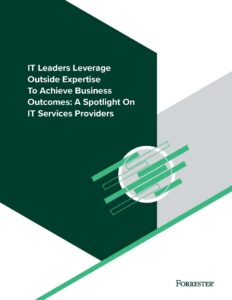Our world is in a state of continuous change, but one thing remains constant – the vital role technology plays in enabling businesses to innovate, to grow and to be productive – to transform as quickly and effectively as possible, while delivering exceptional CX. This is the digital journey our customers are on and the journey we’re on.
Our 2020 Dell Technologies Digital Transformation Index revealed that 80% of businesses fast-tracked some of their digital transformation programs during the last year, and almost all faced persistent barriers including data privacy and security, budget and resource constraints and the inability to extract insights from data.
But there is some good news – these are all issues IT services are designed to address!
I’m a data nerd at heart. It’s at the core of every major investment and business decision, and it’s what we leverage as a company to drive positive change and create better customer experiences. To gain further insight into what IT leaders need from services providers, we commissioned Forrester Consulting to conduct a new global study of 661 IT decision makers (ITDMs).
 In the key themes that emerged from the research, one thing was clear – ITDMs view services as an increasingly critical part of how they’ll leverage technology to transform and win:
In the key themes that emerged from the research, one thing was clear – ITDMs view services as an increasingly critical part of how they’ll leverage technology to transform and win:
- More than 90% plan to maintain or increase their investment in IT services in the next 12 months
- 81% indicate they need external, specialized technology expertise to be successful
- 54% said they are working with IT services providers to enhance their strategic-level planning
- 76% are leveraging more managed services and 46% are looking for services to enable a distributed workforce
- 64% say they’re shifting their IT spend from CAPEX to OPEX and considering flexible consumption models
From solution provider to strategic partner
No matter where IT leaders are in their digital journey, they are turning to technology providers to stay relevant, competitive and deliver exceptional customer experiences. 56% of ITDMs surveyed said improving CX is a top driver for their digital transformation efforts.¹ And to get the most out of their technology investments, they need trusted advisors to guide them.
Strategic IT services partners deliver measurable results for each unique customer – from large enterprise to small and medium business. This requires:
- End-to-end capabilities that support the entire technology lifecycle
- Deep knowledge of current and emerging technologies (Cloud, 5G, Edge, Data Management, AI/ML, Security) to help internal IT teams realize the full value of their investments sooner
- Outcome-driven solutions with flexible financial and engagement models that give customers the ability to invest in what they need today and pivot quickly
- Digital reach with proven track record of maximizing performance and uptime through proactive, predictive and prescriptive technologies
- Infrastructure and physical scale to deliver services globally
When these attributes are combined, the potential for true strategic partnership emerges.
Over the course of delivering tens of thousands of transformation projects, we’ve developed repeatable outcome-driven tools, methodologies and IP that enable organizations to assess where they are, define where they want to be, understand what technology makes possible and move quickly to achieve tangible business outcomes.
GOAL CEO Siobhan Walsh described her recent experience this way: “What I personally have learned through our engagement with Dell Technologies is you don’t have to do a six-month consultancy exercise. There are methodologies and tools with quick output that you can trust to guide your strategy.”
There are methodologies and tools with quick output that you can trust to guide your strategy.” Siobhan Walsh, GOAL CEO
The value of relationships…priceless
Forrester’s research also revealed the importance of relationships. Firms who had established relationships with IT services providers reported being in a better position to respond to the events of 2020 and the ever-changing technology landscape. IT leaders said those relationships helped them reduce risk, accelerate the transition to remote work and apply industry best practices to solve challenges. So it is no surprise to see Forrester cite “engage IT services partners early to define outcomes together” in their recommendations.
Strategic IT services partners enable the discussion to expand beyond technology and can give IT leaders and their teams the edge they need. Some of the most critical conversations I have with our customers are about people, processes, operating models and even culture. The video above provides a great example of how BP transformed how their employees work – giving them the power to choose the technology that fuels their innovation.
Transformation is now a business imperative and leveraging the right services is just as important as adopting the right technology. Let’s move forward together.
See the full study from Forrester Consulting and schedule a briefing with Dell Technologies to learn more about the results.
1 Source: A commissioned study conducted by Forrester Consulting on behalf of Dell Technologies, March 2021.